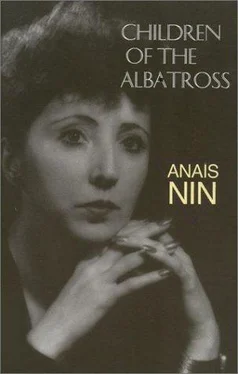Anaïs Nin - Children of the Albatross
Здесь есть возможность читать онлайн «Anaïs Nin - Children of the Albatross» весь текст электронной книги совершенно бесплатно (целиком полную версию без сокращений). В некоторых случаях можно слушать аудио, скачать через торрент в формате fb2 и присутствует краткое содержание. Год выпуска: 1959, ISBN: 1959, Издательство: Swallow Press, Жанр: Классическая проза, Эротические любовные романы, на английском языке. Описание произведения, (предисловие) а так же отзывы посетителей доступны на портале библиотеки ЛибКат.
- Название:Children of the Albatross
- Автор:
- Издательство:Swallow Press
- Жанр:
- Год:1959
- ISBN:9780804000390
- Рейтинг книги:4 / 5. Голосов: 1
-
Избранное:Добавить в избранное
- Отзывы:
-
Ваша оценка:
- 80
- 1
- 2
- 3
- 4
- 5
Children of the Albatross: краткое содержание, описание и аннотация
Предлагаем к чтению аннотацию, описание, краткое содержание или предисловие (зависит от того, что написал сам автор книги «Children of the Albatross»). Если вы не нашли необходимую информацию о книге — напишите в комментариях, мы постараемся отыскать её.
Children of the Albatross — читать онлайн бесплатно полную книгу (весь текст) целиком
Ниже представлен текст книги, разбитый по страницам. Система сохранения места последней прочитанной страницы, позволяет с удобством читать онлайн бесплатно книгу «Children of the Albatross», без необходимости каждый раз заново искать на чём Вы остановились. Поставьте закладку, и сможете в любой момент перейти на страницу, на которой закончили чтение.
Интервал:
Закладка:
Not at all. If he painted well, it was the spring day. If he were gay, it was the Pernod. If he were wise, it was the little book of Lao-tse’s sayings. If he were elated, it was due to a worshipful letter in the mail.
And me, and me, said a small, anxious voice in Lillian’s being, where am I?
She was not even the woman in his paintings.
He was painting Sabina. He painted her as a mandrake with fleshy roots, bearing a solitary purple flower in a purple bell-shaped corolla of narcotic flesh. He painted her born with red-gold eyes always burning as from caverns, from holes in the earth, from behind trees. Painted her as one of the luxuriant women, a tropical growth, excommunicated from the bread line as too rich a substance for everyday living, placing her there merely as a denizen of the world of fire, and was content with her intermittent, parabolic appearances.
So, if she was not in his paintings, Lillian thought, where was she? When he finished painting he drank. When he drank he exulted in his powers and palmed it all on the holy ghost inside of him, each time calling the spirit animating him by a different name that was not Lillian. Today it was the holy ghost, and the spring light and a dash of Pernod.
He did not say what Lillian wanted to hear: “You are the holy ghost inside of me. You make my spring.”
She was not even sure of that—of being his holy ghost. At times it seemed to her that he was painting with Djuna’s eyes. When Djuna was there he painted better. He did not paint her. He only felt strong and capable when he tackled huge masses, strong features, heavy bodies. Djuna’s image was too tenuous for him.
But when she was there he painted better.
Silently she seemed to be participating, silently she seemed to be transmitting forces.
Where did her force come from? No one knew.
She merely sat there and the colors began to organize themselves, to deepen, as if he took the violet from her eyes when she was angry, the blue when she was at peace, the gray when she was detached, the gold when she was melted and warm, and painted with them. Using her eyes as a color chart.
In this way he passed from the eyes of Lillian which said: “I am here to warm you.” Eyes of devotion.
To the eyes of Sabina which said: “I am here to consume you.”
To the eyes of Djuna which said: “I am here to reflect your painter’s dream, like a crystal ball.”
Bread and fire and light, he needed them all. He could be nourished on Lillian’s faith but it did not illumine his work. There were places into which Lillian could not follow him. When he was tormented by a half-formed image he went to Djuna, just as once walking through the streets with her he had seen a child bring her a tangled skein of string to unravel.
He would have liked the three women to love each other. It seemed to him that then he would be at peace. When they pulled against each other for supremacy itwas as if different parts of his own body pulled against each other.
On days when Lillian accepted understanding through the eyes of Djuna, when each one was connected with her role and did not seek to usurp the other’s place he was at peace and slept profoundly.
(If only, thought Lillian, lying in the disordered bed, when he moved away I could be quiet and complete and free. He seems bound to me and then so completely unbound. He changes. One day I look at him and there is warmth in him, and the next a kind of ruthlessness. There are times when he kisses me and I feel he is not kissing me but any woman, or all the women he has known. There are times when he seems made of wax, and I can see on him the imprint of all those he has seen during the day. I can hear their words. Last night he even fraternized with the man who was courting me. What does this mean? Even with Edgar who was trying to take me away from him. He was in one of his moods of effusive display, when he loved everybody. He is promiscuous. I can’t bear how near they come, they talk in his face, they breathe his breath. Anyone at all has this privilege. Anyone can talk to him, share his house, and even me. He gives away everything. Djuna says I lack faith… Is that what it is? But how can I heal myself? I thought one could get healed by just living and loving.)
Lying in bed and listening to Jay whistling while he shaved in the bathroom, Lillian wondered why she felt simultaneously in bondage and yet unmarried, unappeased, and all her conversations with Djuna with whom she was able to talk even better than to monologue with herself once more recurred to her before she allowed herself to face the dominant impulse ruling her: to run away from Jay.
Passion gathered its mometum, its frenzy, from the effort to possess what was unpossessable in reality, because it sprang from an illusion, because it gained impetus from a secret knowledge of its unfulfillable quality, because it attacked romantic organisms, and incited to fever in place of a natural union by feelings. Passion between two people came from a feverish desire to fuse elements which were unfusable. The extreme heat to which human beings subjected themselves in this experiment, as if by intensity the unfusable elements could be melted into one—water with fire, fire with earth, rock and water. An effort doomed to defeat.
Lillian could not see all this, but felt it happening, and knew that this was why she had wept so bitterly at their first quarrel: not weeping over a trivial difference but because her instinct warned her senses that this small difference indicated a wider one, a difference of elements, by which the relationship would ultimately be destroyed.
In one of his cheerful human moods Jay had said: “If my friends bother you so much, we shall put them all against a wall and shoot them.”
But Lillian knew that if today Jay surrendered today’s set of friends, he would renew the same kind of relationships with a new set, for they reflected the part of him she did not feel close to, the part in fact she was at war with.
Lillian’s disproportionate weeping had seemed childish to Jay who saw only the immediate difference, but Lillian was weeping blindly with a fear of death of the relationship, with her loss of faith sensing the first fissure as the first symbol of future dissolution, and knowing from that moment on that the passion between them would no longer be an affirmation of marriage but a struggle against death and separation.
(Djuna said: You can’t bear to let this relationship die. But why must it die, Djuna? Do you believe all passion must die? Is there nothing I can do to avoid failure? Passion doesn’t die of natural death. Everyone says passion dies, love dies, but it’s we who kill it. Djuna believes this. Djuna said: You can fight all the symptoms of divorce when they first appear, you can be on your guard against distortions, against the way people wound each other and instill doubt, you can fight for the life and continuity of this passion, there is a knowledge which postpones the death of a relationship, death is not natural, but, Lillian, you cannot do it alone, there are seeds of death in his character. One cannot fight alone for a living relationship. It takes the effort of two. Effort, effort. The word most foreign to Jay. Jay would never make an effort. Djuna, Djuna, couldn’t you talk to him? Djuna, will you talk to him? No, it’s useless, he does not want anything that is difficult to reach. He does not like effort or struggles. He wants only his pleasure. It isn’t possessiveness, Djuna, but I want to feel at the center so that I can allow him the maximum freedom without feeling each time that he betrays everything, destroys everything. )
She would run away.
When Jay saw her dressing, powdering her face, pulling up her stockings, combing her hair, he noticed no change in her gestures to alarm him, for did she not always comb her hair and powder and dress with the flurry of a runaway. Wasn’t she always so uneasy and overquick, as if she had been frightened?
Читать дальшеИнтервал:
Закладка:
Похожие книги на «Children of the Albatross»
Представляем Вашему вниманию похожие книги на «Children of the Albatross» списком для выбора. Мы отобрали схожую по названию и смыслу литературу в надежде предоставить читателям больше вариантов отыскать новые, интересные, ещё непрочитанные произведения.
Обсуждение, отзывы о книге «Children of the Albatross» и просто собственные мнения читателей. Оставьте ваши комментарии, напишите, что Вы думаете о произведении, его смысле или главных героях. Укажите что конкретно понравилось, а что нет, и почему Вы так считаете.












